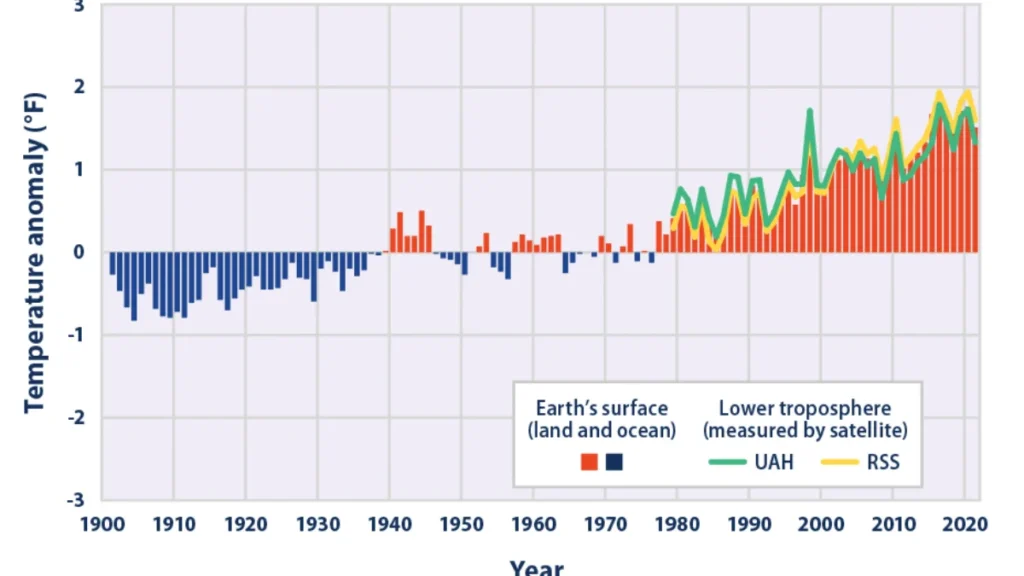Climate change is a global issue that is affecting our planet in numerous ways. It refers to long-term shifts in temperature and weather patterns, largely caused by human activities such as the burning of fossil fuels and deforestation. The consequences of climate change are far-reaching and impact various aspects of our lives, from the environment to human health. In this article, we will explore the causes of climate change, the impact it has on temperature, and the potential solutions to mitigate its effects.
Causes of climate change
One of the primary causes of climate change is the release of greenhouse gases into the atmosphere. These gases, such as carbon dioxide and methane, trap heat from the sun and prevent it from escaping back into space. The main source of these emissions is the burning of fossil fuels for energy production, transportation, and industrial processes. Deforestation also contributes to climate change by reducing the Earth’s capacity to absorb carbon dioxide.
The impact of climate change on temperature
The increase in greenhouse gases has led to a rise in global temperatures. This phenomenon, known as global warming, is the main consequence of climate change. The warming trend can be observed through various indicators, including rising sea levels, melting ice caps, and more frequent and severe heatwaves. These changes in temperature have profound effects on the planet, impacting both natural ecosystems and human societies.
Rising global temperatures: evidence and trends
Multiple lines of evidence support the fact that global temperatures are on the rise. Scientists have been collecting data from various sources, including weather stations, satellites, and ice cores, to track temperature changes over time. These records consistently show an upward trend, with the past few decades being the warmest in recorded history. The rate of temperature increase has also accelerated in recent years, indicating the urgency of addressing climate change.
Effects of increased temperatures on ecosystems
The rising temperatures have significant consequences for ecosystems around the world. One of the most noticeable impacts is the loss of biodiversity, as many species struggle to adapt to the changing climate. Coral reefs, for example, are highly sensitive to temperature changes and are experiencing widespread bleaching events. Additionally, rising temperatures can disrupt ecosystems by altering the timing of natural events, such as animal migrations and plant flowering. These disruptions can have far-reaching implications for the overall functioning of ecosystems.
Human health risks associated with rising temperatures
The increasing temperatures pose serious risks to human health. Heatwaves can lead to heatstroke, dehydration, and other heat-related illnesses, particularly in vulnerable populations such as the elderly and children. Additionally, higher temperatures can worsen air quality, leading to an increase in respiratory problems and cardiovascular diseases. Furthermore, climate change can indirectly impact human health through its effects on food and water security, as changes in temperature and precipitation patterns can disrupt agricultural systems and increase the spread of waterborne diseases.
Strategies to mitigate the effects of climate change
To mitigate the effects of climate change, it is essential to reduce greenhouse gas emissions. This can be achieved through various strategies, such as transitioning to renewable energy sources, improving energy efficiency, and promoting sustainable transportation. Another important approach is the conservation and restoration of natural ecosystems, which can act as carbon sinks and help absorb excess carbon dioxide from the atmosphere. Additionally, individuals can contribute by adopting sustainable practices in their daily lives, such as reducing waste, conserving water, and supporting local, environmentally-friendly initiatives.
The role of government policies in addressing climate change
Government policies play a crucial role in addressing climate change on a larger scale. By implementing regulations and incentives, governments can encourage industries to reduce their emissions and invest in clean technologies. International agreements, such as the Paris Agreement, also facilitate global cooperation in combating climate change. However, it is important for governments to prioritize long-term sustainability over short-term economic gains and ensure that their policies are enforced effectively.
Climate change and the future of our planet
If we fail to take action to combat climate change, the consequences could be catastrophic. Rising sea levels could lead to coastal flooding and the displacement of millions of people. Extreme weather events, such as hurricanes and droughts, may become more frequent and severe. Ecosystems could collapse, leading to a loss of biodiversity and the disruption of essential ecosystem services. It is crucial that we act now to reduce greenhouse gas emissions and transition to a more sustainable future for the sake of our planet and future generations.
Conclusion
Climate change is a pressing issue that requires immediate action. We have explored the causes and impacts of climate change, as well as potential strategies to mitigate its effects. It is essential for individuals, governments, and businesses to work together and make sustainable choices to reduce greenhouse gas emissions. By adopting renewable energy sources, conserving resources, and promoting biodiversity, we can make a significant difference in combating climate change and preserving the health and well-being of our planet.
FAQ’s
1. What is the difference between climate change and global warming?
Global warming refers specifically to the increase in global temperatures due to the accumulation of greenhouse gases in the atmosphere. Climate change, on the other hand, encompasses a broader range of changes in weather patterns and other aspects of the Earth’s climate system.
2. Can individual actions really make a difference in combating climate change?
While individual actions alone may not solve the problem entirely, they do play a significant role in reducing greenhouse gas emissions. Collectively, small changes in behavior, such as reducing energy consumption and adopting sustainable practices, can have a substantial impact when multiplied by millions of people.
3. What can governments do to address climate change?
Governments can implement policies and regulations to reduce greenhouse gas emissions, promote renewable energy, and encourage sustainable practices. They can also invest in research and development of clean technologies and support international agreements to foster global cooperation in tackling climate change.

